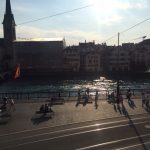There are real hazards in the freedom of religion—not just in the current debates but in the thing people want and call ‘freedom of religion’. This has become very clear this week as we have visited a number of places in and around Zurich which have historical significance in the birth of the Radical Reformation.
Let us begin with Ulrich Zwingli, who lived 1484 – 1531. Formerly a priest in the Catholic Church, he became convinced of the need for a change from the form of church, worship and many other aspects of religion as he knew it. A fine scholar, he led a team of people in translating the Bible into the local language, just as Luther was doing the same in Germany. Zwingli was minister at a very large church in Zurich, the Grossmunster. He oversaw changes to the buildings, removing statues and making it all much more austere. His form of service was also very simple. He preached (apparently ‘hellfire and brimstone’) from a single scripture reading of his own choosing, rather than following the readings set by the Church’s Lectionary. Famously, he also denied that there was any ‘real presence’ in the elements of the Eucharist. The presence of Christ was in the minds of the believers as they responded to the elements as representations of Christ’s body and blood. (Later followers would refer to them as ‘mere symbols’, as if any symbol is ever mere!)
Zwingli also did some very good things in the community: valuable and costly things which had previously adorned church building he had sold, and the funds were used for an extensive program of care for the poor.
In order to preserve the changes he had led, Zwingli made a pact with the city authorities, thus creating a kind of church-state separation, but one which provided mutual support. This was where freedom of religion came to mean ‘freedom of our religion’, which is I think precisely the hazard we see today.
Many people are advocating for freedom of religion. Sometimes too, people want freedom from religion, that is the religion of others, or even all religion. Very often, this concern for freedom of religion actually means the freedom of our religion. This very week I have heard prayers for religious freedom, which then mentioned only Christians.
In this city, Zurich, these issues played out within a very short time of Zwingli’s reforms. A number of younger people took his example seriously and they too began studying the New Testament, and amongst other things became convinced that the practice of the Church in baptising infants was not right. They proposed that baptism in the Bible was offered only to believers, to those who chose to be followers of Christ. In due course they came to believe too that this meant immersion in water, not just pouring water over someone’s head.
These people proposed a more radical reform, and thus resisted the combined forces of Zwingli and the City. So in 1525 Felix Manz, Conrad Grabel and Georg Blaurock (a former priest) baptised each other, using jugs of water taken from a street fountain. When this ‘illegal’ act became known, Manz was arrested. Freedom of religion did not mean freedom of religious conscience! Manz was given a life sentence. Though he escaped from prison that time, he was soon arrested again in 1526 and in January 1527 he was executed by drowning. His limbs were tied together and a plank of timber tied to his body and he was placed in the river right across from the Grossmunster. It was said that since he liked water so much he could go that way.
The threat of death was delivered to all these ‘anabaptists’—radical forbears of the Mennonites, Amish and at least some Baptists. Many others were arrested and more executions occurred in subsequent years.Zwingli’s reform had aligned itself with state power and since these people would not swear allegiance and obedience to the state and its church, they were deemed an impossible threat. Many escaped to a cave in the hills nearby, which I visited last week. There they worshipped in the cold and damp, actually ‘shielded’ by a waterfall.
Freedom of religion here turned into tyranny for others and their religious practices. There is a vital lesson to learn here.
Grossmunster, Zurich, and from there across the river Limmat.
Freedom of religion can drown: here the word drown is the active verb, drowning others. Zwingli seems to have had a quite oppressive streak: he died in battle, against Catholics and peasants.
From the Grossmunster, where Zwingli performed many very valuable things, along with his hellfire and brimstone, you can look directly to where Munz and others lost their lives, also for the freedom of their religion.Here in one place, and in many ways in one man, we can see some of the best and some of the worst of religion.
Freedom of religion is a terrible thing unless it means, as the English Baptist Thomas Helwys put it, freedom ‘for men of all faiths and of none’.
I cannot claim religious freedom unless I am radically committed to the religious freedom of each believer and follower of other faiths, and the freedom of conscience of those who practice no such ‘religion’.
History and morality, good conscience, insist on this. Otherwise, we are drowning in our own hypocrisy.


This is so true, and well written Frank.
Thank you Frank for this contribution and insight..
It is a great story of what some of our forebears had to endure. There is a film on release called “For the Love of God” which also shows the best and worst of Christianity. (I have yet to see it but have heard the Producer interviewed) Those men of faith you mention – who did what they believed to be right – and made mistakes – don’t we all. Our more recent giants of faith – Martin Luther King, Deitrich Bonhoffer and Bishop Desmond Tutu also paid a huge cost for their faith.